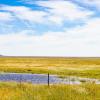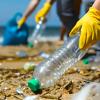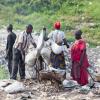
IIASA Energy, Climate, and Environment researcher, Giacomo Falchetta, received the Best Online Poster Award at the Integrated Assessment Modeling Consortium (IAMC)’s recent Sixteenth Annual Meeting in Venice, Italy, for his project focusing on integrated modeling of renewable energy-centered sustainable development futures in rural Africa.
Sub-Saharan Africa is a region suffering from a multiplicity of development gaps and cross-sectoral challenges, particularly in rural areas. Around 40% of the region’s current population live below the poverty line, and the overall size of the rural population is expected to grow by another 300 million by 2050.
“Less than 35% of people have electricity access in rural sub-Saharan Africa, while over 90% of all cropland is rain fed,” notes Falchetta. “As the population in the region grows, these problems will only become more prominent, as water needs for agriculture affect energy demand through water pumping and increased yields. This is why it is very important to introduce tools that can help to dissect and tackle these problems across sectors.”
The IAMC is a forum for cooperation between different scientific research institutions, which leads the integrated assessment modeling community in developing new scenarios that can be used to inform policy.
The online poster for which Falchetta received the IAMC award, provides a concise overview of his modeling framework, seeking to analyze and help resolve the multi-dimensional and overlapping challenges in rural sub-Saharan Africa. It focuses on the introduction and implementation of a new modeling framework for multi-sectoral integrated assessment and planning of technologies, investments, and policies to promote sustainable development at the climate-water-renewable energy-agriculture nexus in developing countries (“RE4AFAGRI modeling platform”).
Falchetta’s modeling framework integrates bottom-up water and energy demand and infrastructure assessment models into a national nexus-extended integrated assessment model (MESSAGEix-Nexus). The framework starts with the assessment and projection of water needs under different scenarios and derives the corresponding energy demand. Specific focus is put on the enabling role of renewable energy to achieve energy access, agricultural productivity, and broader sustainable development objectives in different climate, socioeconomic, and policy ambition scenarios.
Multi-scale, multi-sectoral data compiled using this tool can inform public and private decision makers to explicitly consider nexus synergies to promote sustainable development futures. The poster demonstrates a country-study with a focus on Zambia. It is however expected that the modeling platform will also be applied to a wide variety of other country studies in the future.
This project is part of the LEAP-RE RE4AFAGRI project. It is the result of joint efforts between IIASA, the University of Cape Town in South Africa, and Politecnico di Torino in Italy.
News

05 November 2024
Women's education influences fertility rates in sub-Saharan Africa

02 September 2024
IIASA-led research lauded with Outstanding Article Award

15 April 2024

